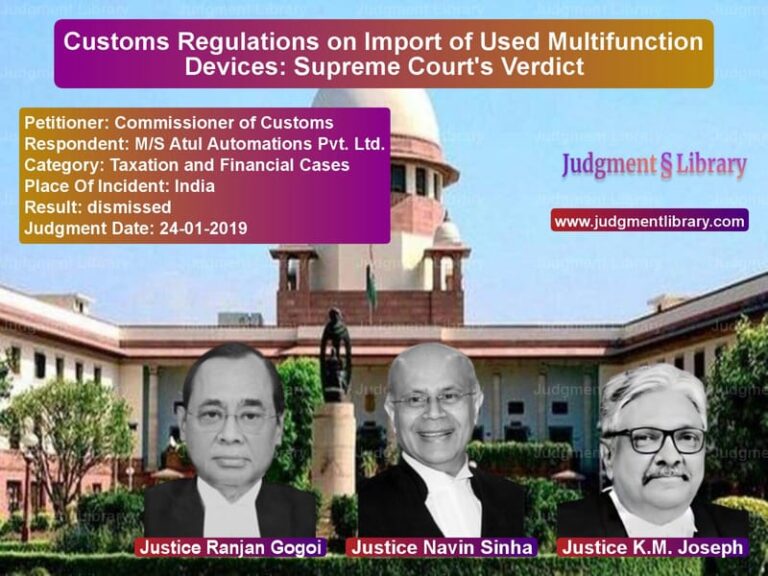Stamp Duty and Registration: Supreme Court Rules on Sale Agreements with Possession Transfer
The case of Seetharama Shetty vs. Monappa Shetty revolved around whether an agreement for sale that included possession transfer requires stamp duty and registration under the Karnataka Stamp Act, 1957. The Supreme Court upheld the Karnataka High Court’s decision, confirming that such agreements must be treated as conveyances and are subject to stamp duty.
Background of the Case
The appellant filed a suit (O.S. No. 295 of 2013) for perpetual injunction to restrain the respondent from interfering with the appellant’s peaceful possession of agricultural land in Kavoor village, Mangalore Taluk. The claim was based on an agreement for sale dated 29.06.1999, under which the appellant was put in possession of the property as part performance of the contract.
The respondent denied executing the agreement and argued that it was insufficiently stamped. The trial court impounded the agreement under Section 33 of the Karnataka Stamp Act and directed the District Registrar to determine the deficit stamp duty and penalty. The Registrar found that the document required Rs. 71,200 in stamp duty, and the trial court imposed a penalty of ten times this amount (Rs. 7,83,200). The appellant challenged this order before the Karnataka High Court, which dismissed the appeal. The case was then taken to the Supreme Court.
Key Legal Issues
- Does an agreement for sale with possession transfer qualify as a conveyance under the Karnataka Stamp Act?
- Can a court impose a penalty of ten times the deficit stamp duty under Section 34 of the Act?
- Should the matter have been referred to the District Registrar for penalty adjudication under Section 39?
Arguments by the Appellant
The appellant argued that:
- The agreement was only for sale and should not be treated as a conveyance.
- Section 34 mandates a penalty but does not allow the court to impose the maximum penalty of ten times the deficit stamp duty without discretion.
- The agreement should have been sent to the District Registrar for determination of the penalty under Section 39.
- Courts have discretion to reduce penalties in cases where the default was unintentional.
Arguments by the Respondent
The respondent countered that:
- The agreement explicitly stated that possession was transferred, making it a conveyance under Section 2(d) read with Article 20(1) of the Karnataka Stamp Act.
- The Karnataka High Court had correctly ruled that courts have no discretion under Section 34 to reduce the penalty.
- The appellant was aware of the stamp duty requirements but failed to comply.
Supreme Court’s Observations
1. Stamp Duty and Conveyance
The Court confirmed that agreements for sale with possession transfer fall under the definition of conveyance and require ad valorem stamp duty:
“Where an agreement to sell includes a clause transferring possession, it must be treated as a conveyance and attract appropriate stamp duty.”
2. No Discretion Under Section 34
The Court held that the penalty imposed under Section 34 must be ten times the deficit stamp duty, and courts have no discretion to reduce it:
“The legislature has not vested courts with the discretion to waive or reduce the penalty under Section 34. The provision clearly mandates the imposition of ten times the deficit duty.”
3. Role of the District Registrar
The Court ruled that the matter should have been sent to the District Registrar under Section 39 for penalty determination:
“The District Registrar has the discretion to determine the penalty. The trial court erred in directly imposing ten times the penalty without referring the matter to the Registrar.”
4. Principle of Fiscal Legislation
The Court reaffirmed that the Stamp Act is a fiscal measure, intended to generate revenue rather than penalize unintentional defaults:
“The object of the Act is to collect revenue and ensure compliance with stamp duty obligations, not to impose punitive measures disproportionate to the violation.”
Final Judgment
The Supreme Court partially allowed the appeal, modifying the penalty imposed:
“The trial court’s order imposing ten times the deficit stamp duty as a penalty is set aside. The matter is remanded to the District Registrar for penalty determination under Section 39.”
Impact of the Judgment
This ruling has significant implications for real estate transactions and stamp duty laws:
- Agreements for sale with possession transfer are conveyances and must be stamped accordingly.
- Courts cannot reduce penalties under Section 34 but must refer cases to the District Registrar for penalty adjudication.
- Stamp duty compliance is mandatory to avoid legal and financial consequences.
- Parties should ensure proper stamping before relying on documents in court to prevent them from being impounded.
This judgment clarifies key aspects of the Karnataka Stamp Act and ensures uniform enforcement of stamp duty laws.
Petitioner Name: Seetharama Shetty.Respondent Name: Monappa Shetty.Judgment By: Justice S.V.N. Bhatti.Place Of Incident: Mangalore, Karnataka.Judgment Date: 02-09-2024.
Don’t miss out on the full details! Download the complete judgment in PDF format below and gain valuable insights instantly!
Download Judgment: seetharama-shetty-vs-monappa-shetty-supreme-court-of-india-judgment-dated-02-09-2024.pdf
Directly Download Judgment: Directly download this Judgment
See all petitions in Property Disputes
See all petitions in Contract Disputes
See all petitions in Damages and Compensation
See all petitions in Judgment by S.V.N. Bhatti
See all petitions in partially allowed
See all petitions in Remanded
See all petitions in supreme court of India judgments September 2024
See all petitions in 2024 judgments
See all posts in Civil Cases Category
See all allowed petitions in Civil Cases Category
See all Dismissed petitions in Civil Cases Category
See all partially allowed petitions in Civil Cases Category







